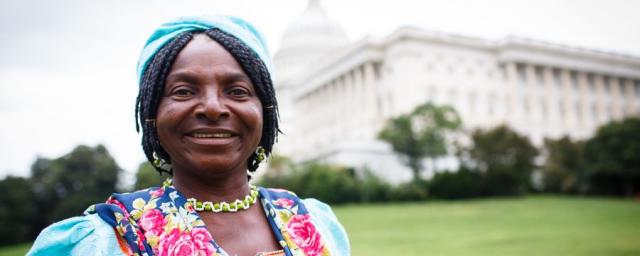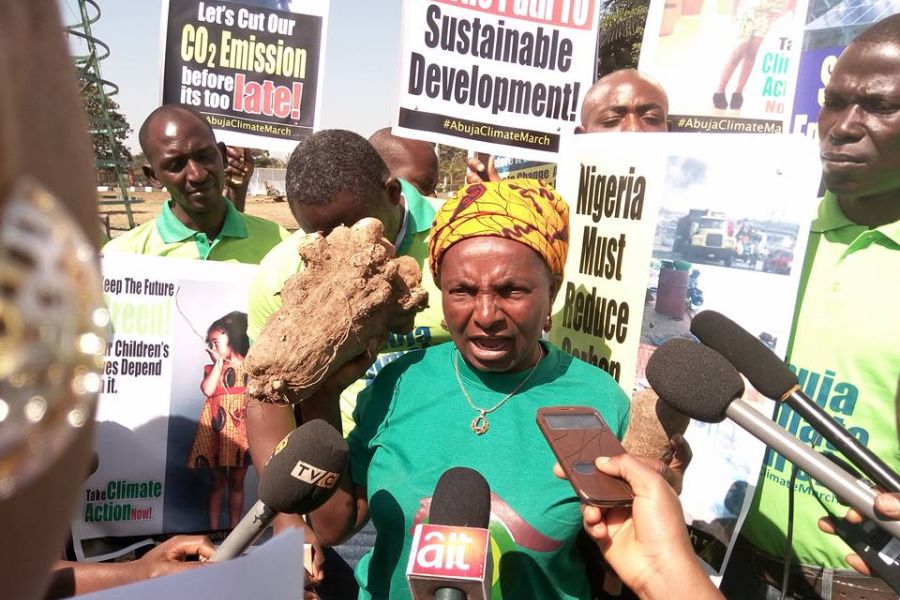
“Women do not own lands in my community except if they are able to buy one, as most of the lands in a family are passed on to the male children. So a woman who intends to own a land must be prepared to work hard.”
Monica Maigari was born and raised in her native community of Madakiya, Zango-Kataf, located in the southern part of Kaduna state of northwestern Nigeria. In 2014, her accomplishments as a farmer, community leader, and women’s advocate won her recognition as an Oxfam Female Food Hero. Since that time, she has deepened her involvement in the local community while sharing her expertise with influential audiences.
Monica has been a farmer for more than 30 years. Despite tremendous challenges faced by rural women farmers, such as land accessibility, labor costs, market access, and climate change, she has achieved great success. She started with a small plot for maize cultivation in 1984 then diversified into various crops and livestock farming.
Defying local convention
She also engaged in value-add activities such as the processing of nutritional local food delicacies. Her entrepreneurial spirit has led to popular products such as a ginger powder which is sold locally as a spice and nutritional supplement.
Like all farmers in her region, Monica’s agricultural productivity is threatened by climate change. She is leading her community in adapting to the effects while challenging policymakers to act.
In November 2014, out of the 1,280 contestants nationwide for Oxfam’s #OgbongeWoman [Female Food Heroes competition in Nigeria] competition, Monica won the Female Food Hero title for her entrepreneurial and leadership qualities. Defying local convention, she chose to purchase farmland with her prize money.
 In November 2015 Monica was part of the "Abuja Climate march" which aim was to press for stringent measures by world leaders on climate change as they were meeting in Paris. She spoke with the press on the effects of climate change on farming.
In November 2015 Monica was part of the "Abuja Climate march" which aim was to press for stringent measures by world leaders on climate change as they were meeting in Paris. She spoke with the press on the effects of climate change on farming.
According to her, “Women do not own lands in my community except if they are able to buy one, as most of the lands in a family are passed on to the male children. So a woman who intends to own a land must be prepared to work hard in order to earn the money she needs to acquire a land. I decided to use the Female Food Hero award money to buy a land in order to reduce the cost of renting a land and to help plough back that money into my agribusiness.”
Monica now engages the services of about 14 seasonal laborers, mostly young people, to work on her farm. “Now that I own my own land, these young people will have more work to do and more money in their pocket,” she says.
A truly life changing experience
She describes the FFH as being a truly life changing experience, “I acquired several skills, I was taught the value chain, my productivity, yield and income has steadily increased. I am more financially stable.”
Since her recognition from Oxfam, Monica has been in demand as a speaker throughout Nigeria and abroad. She has addressed development conferences in Addis Ababa, Ethiopia; audiences in Virginia; a congressional briefing at the U.S. Capitol; and the World Food Prize’s Borlaug Dialogue, held in Des Moines, Iowa.
Her expertise is refreshing because of her authenticity. She is not a government official, corporate representative, or academic. While these roles are important, the perspective of a true smallholder farmer living on the frontlines of gender inequities, climate change, and human conflict is rarely heard. From foreign aid effectiveness to corporate sustainability, her insights are essential for informed decision-making for anyone concerned with international agricultural development.
Being an Ogbonge woman has enlightened and exposed her, and she is now able to educate other female farmers and inspire women to go into agriculture.
Realizing this yet always humble, Monica simply describes herself as “a hard-working woman dedicated to helping other women, especially those less privileged, to grow in their farming.”